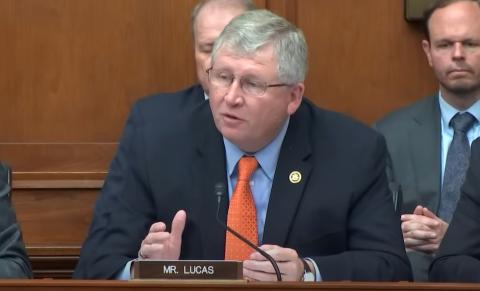An influential member of the US House of Representatives is pressing US banking regulators to address concerns expressed by derivatives end-users about the proposed increase in bank capital requirements that will increase the cost of clearing.
Speaking at a hearing of the House Financial Services Committee on 15 May, Rep. Frank Lucas, an Oklahoma Republican, said he is concerned that the proposed capital requirements "will significantly constrain the capacity of banks to offer central clearing."
Lucas noted that the number of banks that can clear derivatives for end-users has fallen over time, and he asked the two regulators appearing at the hearing why they were pursuing a policy change that would have the effect of further reducing end-user access to derivatives markets.
"Clearing is a risk-reducing function for the market, but the Endgame proposal actively penalizes this activity. How do you reconcile this policy contradiction?" he asked Michael Barr, vice chairman of the Federal Reserve Board, and Martin Gruenberg, chairman of the Federal Deposit Insurance Corporation.
Barr and Gruenberg acknowledged the concern but declined to comment on what changes if any they would make to the proposed capital requirements. Barr agreed that central clearing "is an important way we reduce risk in the financial system." Both officials noted that they have received a lot of comments about this issue and they are studying it carefully.
Lucas, who is also a member of the House Agriculture Committee, said the proposed increase in capital requirements has generated "an unprecedented response" from all sectors of the economy. To illustrate the concerns of end-users, he entered into the hearing record several letters from trade associations representing agricultural and energy producers, including a letter from the American Public Power Association and National Rural Electric Cooperative Association.
"I hope you all have the opportunity to review these comments and others from sectors of the economy that typically wouldn’t be compelled to weigh-in on these issues, which speaks to the breadth and consequences of the current proposal,” Lucas told Barr and Gruenberg.
“I believe your agencies have a responsibility to ensure that bank capital standards do not unnecessarily discourage central clearing," he added. "Market participants on the clearing side and the end-user side are warning us of what’s to come. Again, I urge a complete re-proposal here. Make the material changes necessary and then allow Congress and the public to weigh in. The consequences of getting this wrong are too severe.”
In July 2023, US banking regulators proposed two separate but related changes to the capital requirements for banking organizations: the Basel End-Game proposal and the GSIB Surcharge proposal.
The two proposals contain a number of provisions that would have the effect of dramatically increasing capital requirements for derivatives clearing services that banks offer to their clients. Those clients include agricultural businesses, energy producers and public utilities, manufacturing and transportation companies, mortgage lenders, insurance companies, and pension funds that use derivatives to hedge their risks or manage their investments.
Many of these end-users have spoken out against the proposals, saying that the effect will be to make hedging with derivatives more expensive.
"Although these proposals are not aimed directly at end-users, we believe that the indirect effects will be substantial," a group of associations representing energy and other commodity producers warned in a letter submitted in December.
"This could make hedging unaffordable for many energy end-users, which would expose them to higher risks. Alternatively, if end-users decide to pay more to hedge, the costs will flow through to their customers in the form of higher energy prices."
The five associations that signed the letter were the American Gas Association, the American Public Gas Association, the Commodity Markets Council, the Electric Power Supply Association and the Energy Trading Institute.


